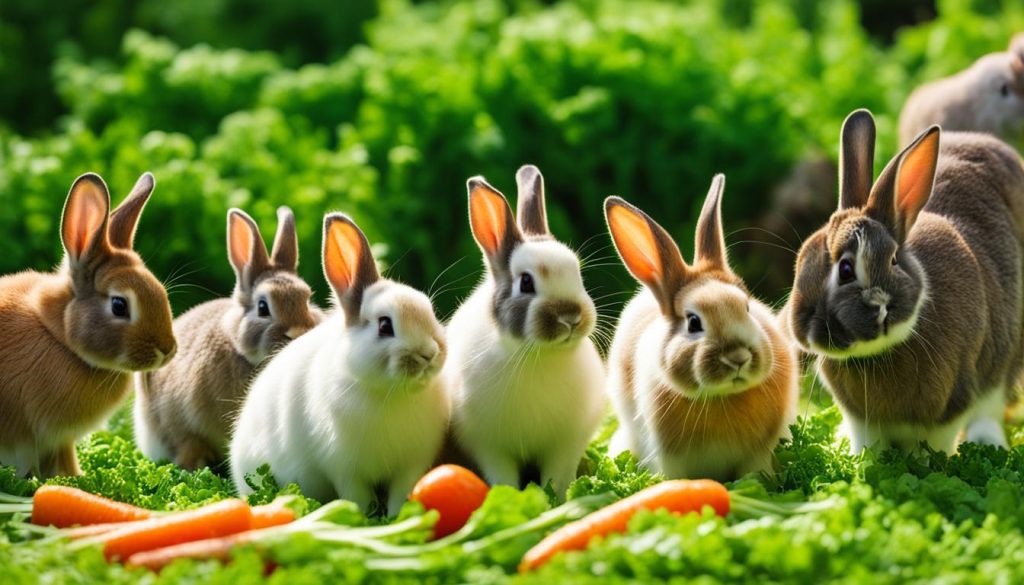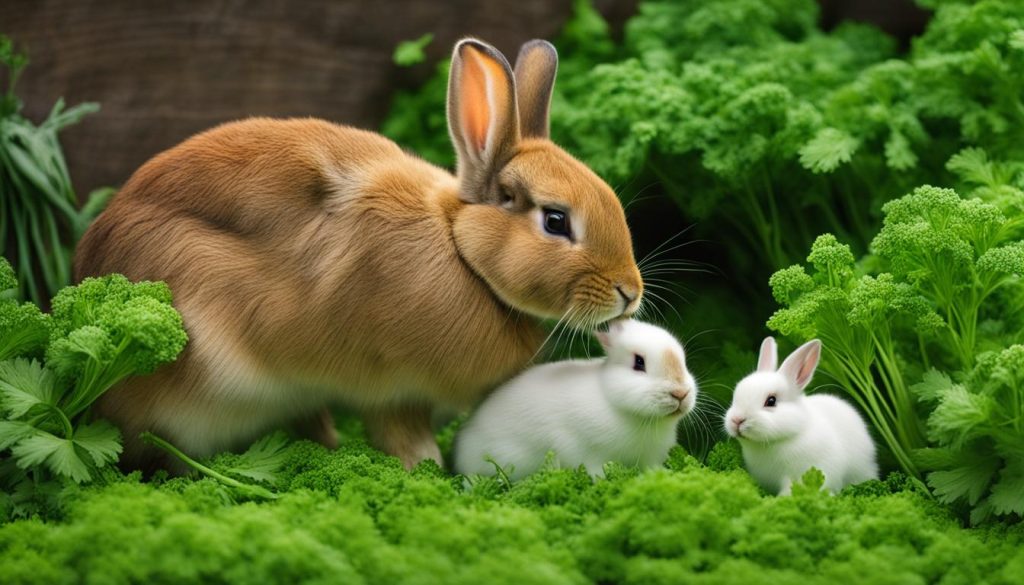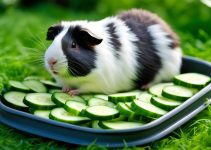Greetings, rabbit enthusiasts! Today, I want to delve into a topic that seems to spark some debate among bunny owners: parsley. If you’ve ever wondered whether rabbits can safely munch on this leafy green herb, you’re in the right place.
From my research and conversations with experienced rabbit owners, I can confidently say that parsley is generally considered safe for rabbits to consume. In fact, it falls into the category of suitable greens for everyday feeding.
Can Rabbits Eat Parsley? Yes, it is safe for them to enjoy.
- Parsley is generally considered safe for rabbits to eat.
- Some controversy exists due to its high oxalic acid content.
- Monitor your rabbit’s response to parsley and adjust the amount based on their individual tolerance and health.
- Other suitable greens for rabbits include lettuce, cilantro, and dill.
- Remember to provide a balanced diet of various vegetables to ensure your rabbit’s overall health and well-being.
The Role of Vegetables in a Rabbit’s Diet
When it comes to a rabbit’s diet, vegetables play a crucial role in providing essential nutrients and maintaining their overall health. Including a variety of vegetables in a rabbit’s diet ensures they receive a well-rounded and balanced nutritional intake.
Green leaf lettuce, along with herbs like parsley, cilantro, and dill, are among the suitable greens that can be included in a rabbit’s daily feeding routine. These vegetables provide a range of vitamins, minerals, and fiber that help support a rabbit’s digestive system and promote overall well-being.

It is recommended to offer approximately 2 cups of fresh vegetables per 6 pounds of rabbit, split into two feedings throughout the day. This ensures that rabbits receive a sufficient amount of nutrients without overwhelming their digestive system.
However, it’s important to be mindful of the nutritional composition of the vegetables being offered. For instance, parsley contains oxalic acid, which can be a concern in larger quantities. While parsley is generally safe for rabbits, it is essential to moderate their intake to avoid any potential health issues.
By incorporating a variety of vegetables, including parsley, into a rabbit’s diet, owners can provide their furry friends with a diverse and nutritious menu that supports their overall well-being. Remember to consult with a veterinarian for specific dietary recommendations tailored to your rabbit’s individual needs.
The Controversy Surrounding Parsley for Rabbits
When it comes to feeding parsley to rabbits, there is an ongoing debate within the rabbit community. Some sources caution against including parsley in a rabbit’s diet due to its high oxalic acid content, which can potentially cause digestive issues. However, many experienced rabbit owners have been feeding parsley to their bunnies without experiencing any negative effects.
As with any food, it is important to monitor your rabbit’s response to parsley and adjust the amount given based on their individual tolerance and overall health. While some rabbits may be able to enjoy parsley without any problems, others may be more sensitive to its oxalic acid levels. Therefore, it’s crucial to observe your rabbit for any signs of discomfort or digestive issues.

Parsley offers a range of potential health benefits for rabbits. It is a good source of fiber, which helps support a healthy digestive system. Additionally, parsley is rich in vitamins and minerals, including vitamin C, vitamin K, and iron.
While the exact safety of parsley for rabbits may be a topic of debate, it’s essential to remember that a rabbit’s diet should be varied and well-balanced. Instead of relying solely on parsley, it’s recommended to offer a variety of leafy greens and vegetables to ensure your rabbit receives all the necessary nutrients for optimal health. This way, you can provide a diverse and nutritious diet while minimizing any potential risks associated with parsley.
Other Recommended Vegetables for Rabbits
Aside from parsley, there are several other vegetables that are generally considered safe and nutritious for rabbits. These include lettuce (excluding iceberg), basil, cilantro, mint, and dill. It is important to provide a variety of vegetables to ensure a well-rounded diet for your bunny. Some vegetables, such as broccoli, cabbage, cauliflower, and brussels sprouts, should be fed in limited quantities due to their higher starch content. Certain vegetables, like kale, spinach, and bell peppers, may also have specific considerations and potential side effects that should be taken into account.
Remember to offer a diverse range of safe vegetables to your rabbit for optimal health benefits. Leafy greens like lettuce, basil, cilantro, mint, and dill are a great addition to your furry friend’s diet. However, foods such as broccoli, cabbage, cauliflower, and brussels sprouts should be fed in moderation due to their higher starch content. Kale, spinach, and bell peppers may have additional factors to consider, so it’s always a good idea to do your research and consult with a veterinarian to ensure you are providing a balanced and healthy diet for your rabbit.
Foods to Avoid for Rabbits
While providing safe and nutritious food is essential for a rabbit’s diet, it’s equally important to be aware of foods that can be harmful to them. Here are some foods to avoid giving to your furry friend:
Onions, garlic, leeks, chives, and other members of the onion family: These vegetables contain compounds that can damage a rabbit’s red blood cells and lead to anemia. It’s best to steer clear of them to ensure your rabbit stays healthy.
Corn: Although rabbits may be attracted to corn, it should be avoided as it can cause bowel obstruction and digestive issues.
Highly processed foods: Items like chocolate, cookies, crackers, bread, and candy should never be given to rabbits. These foods are high in sugar, preservatives, and unhealthy fats, which can negatively impact their health.
Dog or cat food, bird seed, meat, and other inappropriate foods: It’s important to keep rabbits away from these types of foods, as they are not appropriate for their digestive system and can cause various health problems.
To ensure the well-being of your furry companion, it’s crucial to provide a diet consisting of safe and suitable foods. By avoiding the mentioned foods, you can help maintain your rabbit’s optimal health and happiness.
Can Rabbits Eat Parsley? A Summary
The decision to include parsley in your rabbit’s diet ultimately depends on their individual circumstances and preferences. Generally, parsley is considered safe for rabbits to consume. However, it is crucial to monitor their intake and be aware of any potential risks associated with the oxalic acid content present in parsley.
As with any dietary adjustments for your furry friend, it is always advisable to consult with a veterinarian. They can provide personalized guidance based on your rabbit’s specific needs and health status, ensuring a well-balanced diet. Remember, a variety of vegetables should be incorporated into their daily meals to support their overall health and well-being.
While parsley can be part of a rabbit’s diet, it is essential to practice moderation and consider their individual tolerance. By consulting with a veterinarian and providing a diverse range of vegetables, you can maintain a healthy and happy lifestyle for your beloved bunny.
FAQ
Can rabbits eat parsley?
According to reputable sources and experienced rabbit owners, parsley is generally considered safe for rabbits to eat. It falls into the category of suitable greens for everyday feeding. However, there is some controversy surrounding parsley due to its high oxalic acid content.
What is the role of vegetables in a rabbit’s diet?
Vegetables play an important role in a rabbit’s diet, comprising about 15-20% of their overall food intake. Suitable greens for daily feeding include green leaf lettuce and herbs like parsley, cilantro, and dill. The recommended serving size is approximately 2 cups of veggies per 6 pounds of rabbit, split into two feedings.
What is the controversy surrounding parsley for rabbits?
Some sources caution against feeding parsley to rabbits due to its high oxalic acid content, which can potentially cause digestive issues. However, many experienced rabbit owners have included parsley in their bunny’s diet with no negative effects. It is important to monitor your rabbit’s response to parsley and adjust the amount given based on their individual tolerance and overall health.
What are other recommended vegetables for rabbits?
Aside from parsley, other safe and nutritious vegetables for rabbits include lettuce (excluding iceberg), basil, cilantro, mint, and dill. It is important to provide a variety of vegetables to ensure a well-rounded diet for your bunny. Some vegetables, such as broccoli, cabbage, cauliflower, and brussels sprouts, should be fed in limited quantities due to their higher starch content. Specific considerations should also be taken into account for vegetables like kale, spinach, and bell peppers.
What foods should be avoided for rabbits?
Onions, garlic, leeks, chives, and other members of the onion family can be harmful to rabbits. Corn should also be avoided as it can cause bowel obstruction. Highly processed foods, such as chocolate, cookies, crackers, bread, and candy, should never be given to rabbits. Additionally, it is important to keep rabbits away from dog or cat food, bird seed, meat, and other inappropriate foods.
Can rabbits eat parsley? A summary
The suitability of parsley for rabbits depends on individual circumstances and preferences. While parsley is generally considered safe, it is important to monitor intake and consider any potential risks associated with its oxalic acid content. It is advisable to consult with a veterinarian to ensure your rabbit’s specific needs are met and maintain a balanced diet for their overall health and well-being.






